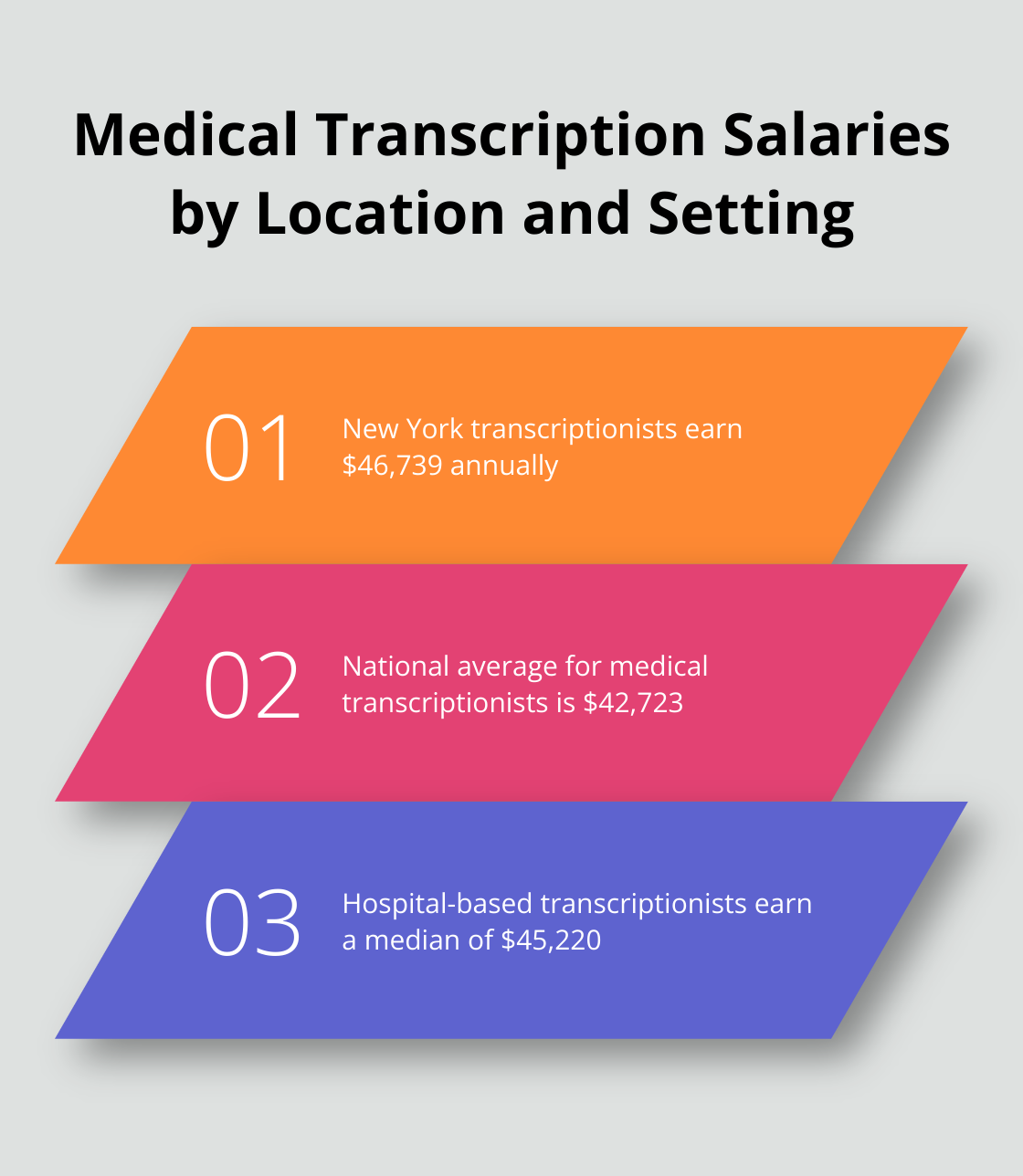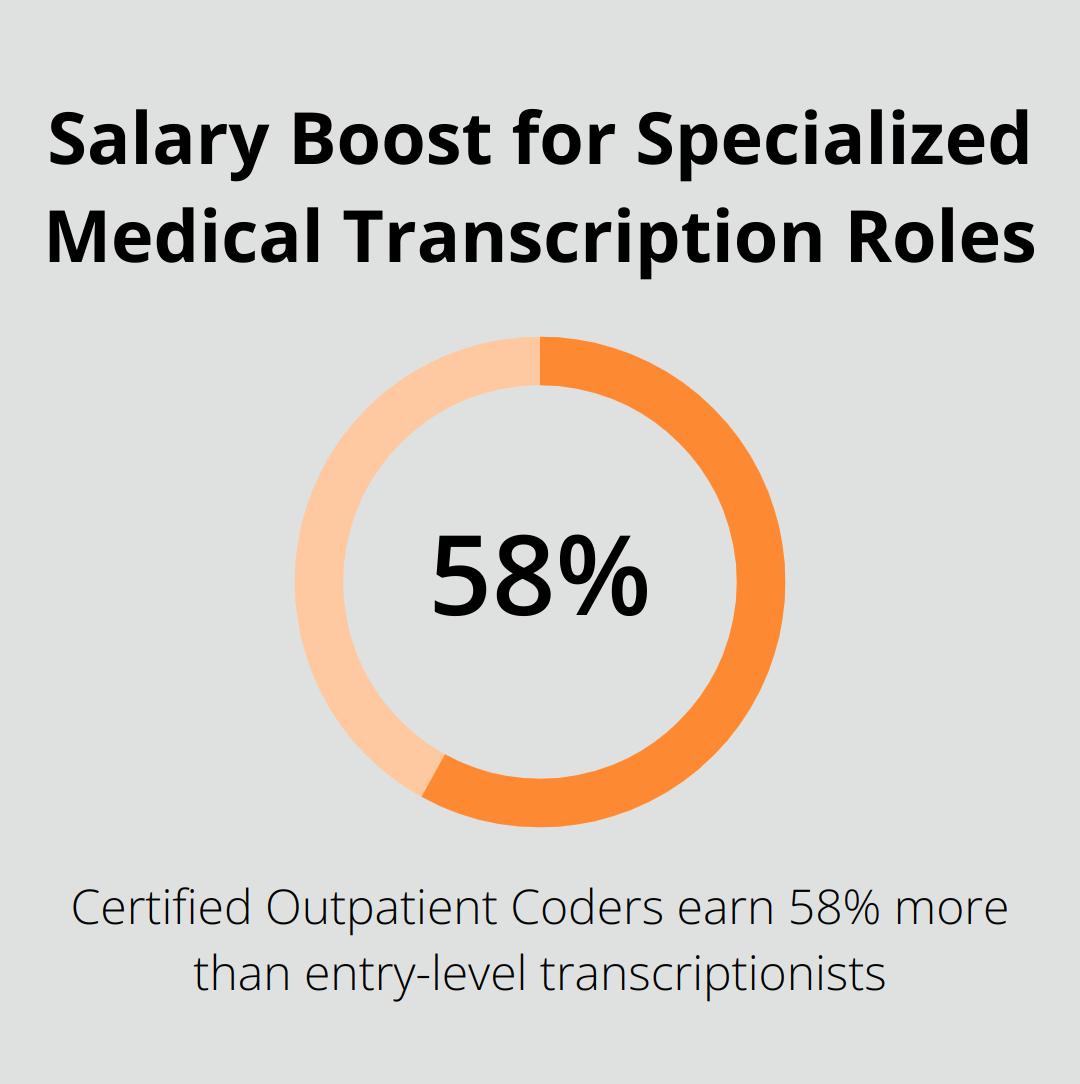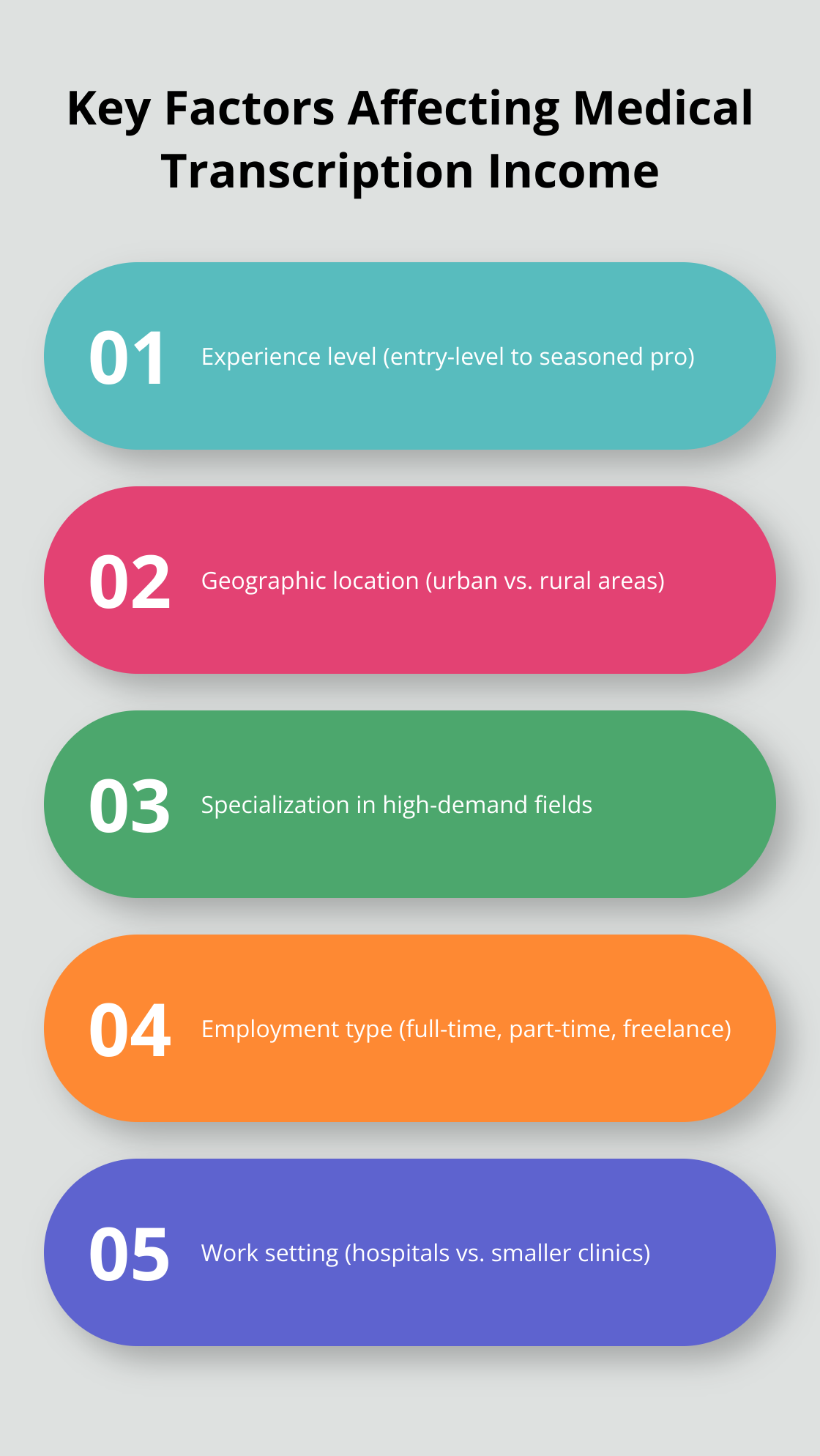Healthcare’s got this gig that’s kind of a hidden gem—medical transcription jobs. At ScriberJoy, we get peppered with questions about the money you can pull in here (and, spoiler alert, it ain’t bad).
So, let’s talk turkey: the cash flow for medical transcription gigs can swing wildly. Why? A whole bunch of things. In what follows, we’ll break down these factors, serve up some average salary figures—and throw in a few hacks to max out your dough in this satisfying line of work.
What Impacts Medical Transcription Pay?
Let’s talk about the money game in medical transcription. It varies-oh boy, does it vary. Some key factors shape how heavy your paycheck feels. Let’s break down what really makes your wallet grow… or just fill it with dust.
Experience Boosts Earnings
Experience is like money in the bank for your career. ZipRecruiter throws out a figure-52K a year for medical transcription. But, hold your horses, because this gets a big side-eye from many pros. As you climb the experience ladder, your skills-and your potential income-get a boost. But hey, let’s not kid ourselves, keep those expectations grounded.
Geographic Location Matters
So, where you park your desk? Big deal. Massive, actually. Urban zones with skyscrapers and high rents? They shell out the big bucks. Say, New York-transcriptionists there pocket around $46,739 a year. That’s 9.4% above the national norm. But venture into Georgia or Arkansas, and you’re singing a different tune-salaries around $36,073 and $35,327 give or take.
Specialization Increases Income
Niched down into the medical maze? It pays. Specializing in fields (say, Certified Outpatient Coding)? We’re talking figures like $58,822 a year. Exact numbers float around, but the trend is clear-go niche, see those dollar signs multiply compared to plain vanilla transcription work.
Employment Type Affects Compensation
How you’re employed? That’s your paycheck’s dance partner. Full-time often means steady paychecks and bennies-like clockwork. But crave that part-time freedom? Expect less dough. Freelancers are the wildcards-more clients can mean more cash, but it also means more hustling and juggling.
Work Setting Impacts Wages
The scene of the crime-your work environment? It’s got a say. Hospitals? They lay it thick on the pay scale. Smaller places like wee clinics? Not so much. The Bureau of Labor Statistics racks it up-hospital-based transcriptionists taught the rest a lesson, hitting a median wage of $45,220 in 2024.

Knowing these levers lets you direct your career ship wisely in the vast ocean of medical transcription. Stick around, as we crack open the average salary vault for transcriptionists spinning through different career phases.
What’s the Real Pay for Medical Transcriptionists?
Let’s talk money-medical transcription salaries swing wildly depending on where you’re at in your career, where you live, and what you specialize in. So, let’s slice the data and see what kind of dough you can roll in this line of work.
Entry-Level Earnings
You’re just off the training wheels, right? Newbie medical transcriptionists pull in around $37,180 a year. Yep, that’s from the Bureau of Labor Statistics and reflects May 2024’s median annual wage. Sure, it’s a tick under the average for all gigs everywhere. But hey, don’t hang up your hat-there’s room to grow if you double down and sharpen those skills.
Mid-Career Money
With some skin in the game, the paycheck starts looking friendlier. Mid-career folks see their earnings take a healthy hike. Shoot, some even zip past the median-especially if you’re clocking in from New York or Washington, where salaries get juicier.
Senior-Level Salaries
Now, if you’ve been around the block and packed in some high-level skills or stepped into management shoes, the cash gets even better. The Bureau of Labor Statistics says the median annual wage for these folks hit $37,550 in May 2024.
How Does This Stack Up?
Stacking it against the nationwide average, yep, transcription salaries are a smidge below. But here’s the kicker-think about the perks: flexibility and remote work opportunities. For many pros, these goodies more than make up for the green gap.
Looking to fatten that paycheck? Zero in on hot niches like radiology or pathology. Grab some extra certifications (like the Certified Healthcare Documentation Specialist) to up your game. Plus, don’t sleep on remote gigs-they can bust open new doors coast to coast.
Bottom line, your cash flow is your own mix of skills, experience, and turf. Keep hustling on your career track, and you’ll spot chances to pump up your income in this ever-changing field.

With salary outlines under our belt, let’s dive into some seriously smart moves to bump up your earnings as a medical transcriptionist.
How to Boost Your Medical Transcription Income
Specialize in High-Demand Areas
Wanna make more dough in medical transcription? Specialize-don’t just float around like a leaf in the wind. Think radiology, pathology, cardiology-these are the sweet spots. Transcriptionists in these areas? They bank more, plain and simple. Being a Certified Outpatient Coder? That could get you around $58,822 a year. Seriously. Want in? Start with some online classes or hustle for internships at hospitals where those departments are buzzing.
Stack Up Those Certifications
Certifications. They’re not just fancy letters that make you look good at cocktail parties-they’re cold, hard cash. That Certified Healthcare Documentation Specialist (CHDS) credential? It’s a game-changer for your paycheck. Kick your earnings up by passing that exam-stay sharp with some retesting or ongoing education. Study sessions each week? Make it happen. Join a study group-because shared brains are better than one.
Climb the Career Ladder
Wanna scale the income ladder? Shift gears to management. Supervisor roles, quality assurance specialists-they’re making it rain compared to your everyday transcription gig. Volunteer for team lead roles or take on quality review tasks. Get that hands-on experience, and you might just find yourself cruising into higher-paying management gigs.
Embrace Remote Work Opportunities
Remote work. It’s not just about wearing pajamas all day. It’s a gold mine. By reaching out-beyond your local backyard-you can score higher-paying gigs. Those remote opportunities? They’re offering competitive pay with the cushy perk of home office life. High-paying roles like Transcript Evaluator or Transcription Manager can pull in up to $66k/year. Yes, seriously.
Improve Your Speed and Accuracy
Your paycheck in medical transcription? It’s all about speed and accuracy-nail both, and you’re in business. Boost your typing speed, cut down errors-practice, practice, practice. Grab typing tutorials, take those speed tests-watch yourself improve. Employers love it when you hit-or better yet, exceed-those speed and accuracy targets. Sometimes, there’s even a bonus. Cha-ching!
Final Thoughts
So, you’re eyeing the medical transcription gig – well, let’s talk dollars and sense. We’re looking at a pay range from $37,180 for the newbies to over $50K for the seasoned pros in those hot spots everyone wants. Why the variance? It’s all about experience, location, and that little niche you might carve out. This field isn’t static; it’s a shape-shifting beast with its own set of hurdles and avenues for growth. Embrace ’em, or be prepared to fade into the background.
Here’s the kicker: if you’re keen on carving a solid career path here, constant skill-sharpening isn’t just nice-to-have – it’s a must. Chasing those certifications, upping your typing game, staying clued into the latest medical lingo… these are not optional extras. They’re your ticket to a bigger paycheck and that oh-so-important job security amidst the rapid changes in healthcare documentation.
Enter stage left: ScriberJoy. We bring you an AI-powered transcription software that’s designed to amp up your earning potential and efficiency. Think of it as top-tier tech meets human oversight, giving you over 99% accuracy in your medical documentation – all while keeping everything HIPAA-compliant. This slick system lets healthcare providers zero in on patient care, without sacrificing the quality of their records.

